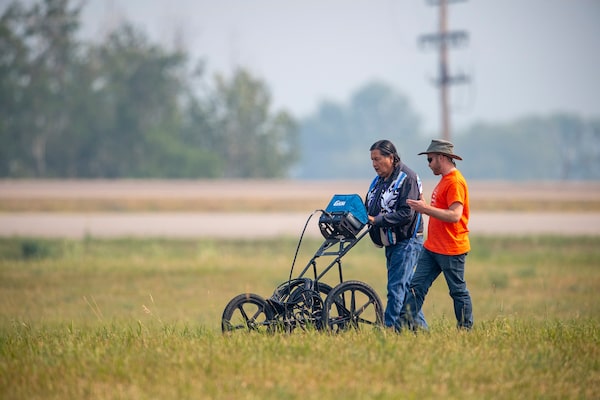
SNC Lavalin engineer Evan Ulmer, right, and Alvin Baptiste use equipment to conduct a search of the grounds at the site of a former Residential School in Delmas, Sask., on July 17, 2021.Liam Richards/The Canadian Press
The federal government intends to appoint an independent official who will help guide the identification and protection of unmarked graves at former residential school sites, but not be involved in criminal investigations, according to a document obtained by The Globe and Mail.
In recent months, Indigenous communities have identified more than 1,200 unmarked graves near former residential schools across the country.
Many of the graves are believed to contain the remains of Indigenous children who were forced to attend the institutions, say First Nations chiefs who are working with experts in the use of ground-penetrating radar to search the sites.
According to a three-page draft document from the Office of the Minister of Justice and Attorney-General, the minister is proposing to appoint an “independent special interlocutor” to work with Indigenous communities and governments, and with religious institutions, which ran most of the residential schools.
“The identification of unmarked graves and burial sites at former residential schools has brought to the public consciousness the depth of pain and sense of injustice felt by Indigenous peoples in Canada,” the federal document says.
“A legal framework is needed to preserve and protect the rights, respect and dignity of the children buried in unmarked burials.”
Beyond acting as a go-between for Indigenous communities, governments and other institutions, the special interlocutor would be required to “make recommendations relating to federal laws, regulations, policies and practices surrounding unmarked burials at former residential schools.”
Those recommendations would lead to the creation of a “new federal legal framework that respects the dignity of burial sites of Indigenous peoples, in line with wishes and traditions of communities and families.”
The yet-to-be appointed official would not be able to conduct criminal investigations.
Many Indigenous leaders want an independent inquiry into what happened at the schools, including a criminal probe headed by experts other than the Royal Canadian Mounted Police.
The document says the special interlocutor will “refrain from all activities that may have the effect of jeopardizing a criminal investigation or prosecution, including but not limited to conducting initial interviews of potential witnesses and victims, collecting original documents, and seizing physical evidence.”
The document says the official could “act as a conduit” and support to victims and communities navigating the justice system.
The document does not state who would be appointed to the position, but notes that whoever is selected would need “the credibility, qualities and capacity to convene people in an environment of trust and understanding.” Legal expertise “is an asset,” but could also be provided by staff, the document notes.
The discoveries of the graves have sparked national outrage, and rekindled a conversation on the reparations owed to Indigenous communities for the trauma caused by residential schools – government-sponsored institutions that disconnected Indigenous children from their languages, traditions and culture.
About 60 per cent of the country’s residential schools were run by the Catholic Church. The Anglicans, United Church and Presbyterians also operated residential schools. The federal government funded most of the institutions.
At least 150,000 First Nations, Métis and Inuit children were taken from their families and forced to attend residential schools from the late 19th century to 1996. The National Centre for Truth and Reconciliation has documented more than 4,100 children’s deaths at residential schools – many from disease, neglect, malnutrition and abuse – and estimates thousands more died.
Last weekend, a Globe and Mail investigation revealed the Catholic Church had $4.1-billion in net assets across 3,446 charitable Catholic organizations in 2019. As part of the Indian Residential Schools Settlement Agreement, a Canada-wide court settlement with survivors, the church was supposed to collect $25-million in a national fundraising campaign.
It raised just $3.7-million, and a Saskatchewan judge released it from the remaining settlement obligations in 2015.
The Globe asked Justice Minister David Lametti for his response to the investigation’s findings during a Monday news conference announcing funds for establishing an independent legal and governance system for the Yellowknives Dene First Nation.
“I’m a practising Catholic,” Mr. Lametti said, “and I am so ashamed about the way the Catholic Church has handled this.” He did not comment on whether the government would re-examine the settlement agreement, an action Indigenous leaders called for on Monday.
In late June, Indigenous Services Minister Marc Miller told The Globe the federal government was open to an independent investigation into what happened at residential schools, and said Indigenous communities should lead next steps.
The Globe also asked Mr. Lametti whether a special official might be appointed to investigate the settlement agreement and issues surrounding unmarked graves at residential school sites, as recommended by the Assembly of First Nations in July.
Mr. Lametti did not respond specifically, saying the government would “move forward with something that is Indigenous-led, that is survivor-centric and that is culturally sensitive working with communities, with Indigenous leadership, with provinces and territories and with other implicated groups.”
Our Morning Update and Evening Update newsletters are written by Globe editors, giving you a concise summary of the day’s most important headlines. Sign up today.